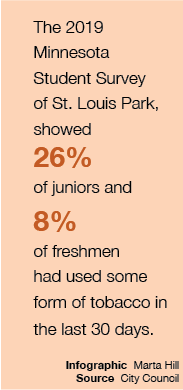City Council bans sale of vape products, e-cigarette products
Ordinance goes into effect Feb. 1
According to Time, Trump issued a partial ban on the sale of certain e-cigarette flavors Jan. 2. Under the ban, companies like JUUL Labs will be prohibited from selling cartridges with mint and fruit flavorings, but will still be allowed to sell menthol and tobacco flavors. In this image, menthol is represented with the blue pod and tobacco is represented with the orange pod.
January 8, 2020
At the first reading of the ordinance, former City Council member Steve Hallfin said the City Council should not get to decide what adults put into their own bodies.
“People put bad things in their bodies all the time. We could be up here trying to ban alcohol. We know how many people get killed because of alcohol every single day,” Hallfin said. “I abhor all tobacco products, all nicotine delivery systems, but that doesn’t change the fact that we have freedoms in this country.”
According to senior Brandon Wetterlin, the ban on the sale of vapes and e-cigarettes in St. Louis Park may not be very effective, especially at trying to limit teenage use.
“Would you ban cigarettes? Would you ban other drugs? I don’t see the purpose behind it,” Wetterlin said. “It is not going to stop people from going to other cities like Minneapolis to try to get vapes.”
On Jan. 6, City Council approved an ordinance to prohibit the sale of e-cigarettes and vaping products in St. Louis Park. The summary of the ordinance will be posted Jan. 26 and the ordinance will go into effect Feb. 1.
According to senior William Schoenecker, the ban could have a large impact on the economy in St. Louis Park.
“They have the right to do it because they are our government, but that doesn’t mean it is necessarily a good idea,” Schoenecker said.
City Council member representing Ward 2 Anne Mavity, said in her support of the ordinance banning the sale of vaping and e-cigarette products she is not ignoring the possible repercussions of the regulation.
“We have to respect the market, all the stakeholders in the community and how these changes can impact people,” Mavity said. “We have 21 establishments that sell tobacco products, but only eight of them actually carry these products, which is an indication to me that even the market is moving away from this. It makes me feel a little bit more comfortable moving forward with this.”
Speaking as a former smoker, mayor Jake Spano said he is worried people dismiss the severity of nicotine addictions. Spano said he is concerned about what he is hearing about high schoolers who cannot go long without vaping.
“I am a former smoker, I’m only about 10-11 months past I think about having a cigarette every day, multiple times a day,” Spano said. “They measure heroin and fentanyl in grams, they measure nicotine in thousands of grams. By weight, it is a highly addictive drug and it’s hold on people is profound.”
According to City Council member Thom Miller, whose term ended after the first reading of the ordinance, the approach taken to restricting vaping should be considered seriously because there are so many unknowns about the repercussions of vaping.
“Any large problem like this has to be taken with a 360 degree approach, there are many people who are working on putting together some type of facet to do whatever we can do to keep the public’s health intact,” Miller said. “In the meantime, we will do what we can do, as the city government we can step in to restrict the sale of vaping products in St. Louis Park.”
Miller said St. Louis Park’s passing of this ordinance is important because it can lead the way in larger scale restrictions.
“We will be taking a leadership moment here,” Miller said. “When we pass something like this it will perhaps lead to other cities passing ordinances, it will perhaps give more leadership to our legislatures and we will have a better opportunity to move this forward.”
This initiative is also moving forward nationally.
According to U.S. News & World Report, in a spending bill passed by Congress and signed by President Trump Dec. 20, 2019, no one under 21 years of age can legally buy cigarettes, cigars or any other tobacco product.






